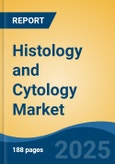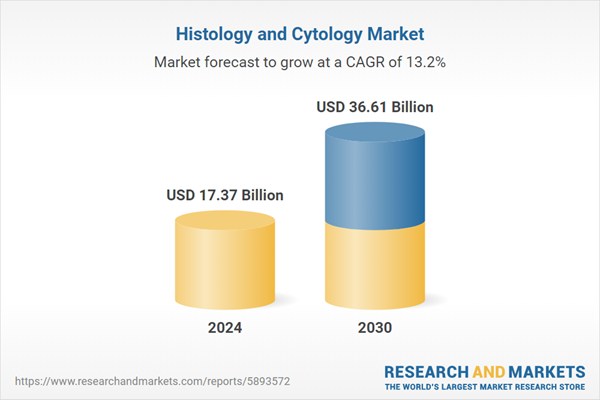Speak directly to the analyst to clarify any post sales queries you may have.
10% Free customizationThis report comes with 10% free customization, enabling you to add data that meets your specific business needs.
The diagnosis of numerous infectious and cell-based disorders, such as cervical diseases, inflammatory diseases, cancer, and autoimmune diseases, is investigated using histology and cytology. The histology and cytology market has been witnessing massive growth in the healthcare industry as a number of diseases can be diagnosed through these clinical studies. With the aid of histology and cytology, a number of infectious diseases can be identified such as cervical disease, cancer, abnormal growth, hepatitis, inflammatory diseases, diarrhea, leukemia, smallpox, rabies etc. From the commercial perspective, cytology and histology are used in the diagnostic and research procedure. The market trends are determined along with the manufacturer’s preference for the development of reagents and kits for these clinical procedures.
The increasing adoption of advanced technologies in diagnostic laboratories, such as digital pathology, AI-assisted imaging, and automated slide preparation, is further propelling the growth of the global histology and cytology market. These innovations enhance diagnostic accuracy, reduce manual errors, and improve workflow efficiency. Additionally, the integration of telepathology allows pathologists to remotely examine slides, which is especially beneficial in rural or underserved areas, thereby expanding access to high-quality diagnostics globally.
Key Market Drivers
Increasing prevalence of cancer
The rising global cancer burden is a major factor accelerating the growth of the Global Histology and Cytology Market. These medical disciplines, which focus on the microscopic examination of cells and tissues, are crucial for early and accurate cancer diagnosis. As cancer incidence continues to climb, particularly among aging populations, the demand for histopathological and cytological evaluations is growing rapidly. According to the International Agency for Research on Cancer (IARC), in 2022 there were approximately 20 million new cancer cases and 9.7 million cancer-related deaths globally figures expected to increase substantially in the coming decades.Furthermore, the number of cancer screening procedures is rising, particularly in emerging economies with expanding healthcare infrastructure. Cytological methods such as the Pap smear remain essential for cervical cancer screening. According to the World Health Organization (WHO), over 90% of cervical cancer cases are preventable and treatable if detected early and managed appropriately placing histology and cytology at the heart of global cancer control strategies. The increased use of biopsy techniques to assess tumors has also led to a surge in histopathological evaluations, further driving market demand. Combined with advances in digital pathology, AI-powered diagnostics, and molecular cytology, these trends ensure strong growth for histology and cytology technologies in oncology.
In addition to diagnostics, the role of histology and cytology in therapeutic monitoring is gaining prominence. As more cancer patients undergo treatments like chemotherapy, immunotherapy, or targeted therapy, regular assessment of tissue samples helps monitor treatment response and detect any recurrence or resistance. This has fueled the integration of advanced cytological imaging systems and histological staining technologies in clinical laboratories and hospitals. The demand for accurate pathological interpretation has also led to growing collaborations between hospitals and diagnostic centers, further expanding access to histology and cytology services.
Key Market Challenges
Technological Complexity and Costs
Advanced histology and cytology technologies often require significant upfront investments in terms of equipment, software, training, and infrastructure. This can be a barrier for smaller clinics, hospitals, and research facilities with limited financial resources. The high initial investment can lead to slower adoption rates, especially in regions with budget constraints. Utilizing complex histology and cytology technologies requires a skilled workforce with specialized training. Training pathologists, technicians, and clinicians to effectively use and interpret data from these technologies can be time-consuming and costly. The scarcity of skilled personnel can further impede technology adoption.Technologically advanced equipment typically requires regular maintenance and updates to ensure optimal performance. The costs associated with maintenance, repairs, and software updates can add to the overall expenses for healthcare institutions. This ongoing financial commitment can be a deterrent, particularly for smaller facilities. Integrating new technology into existing healthcare systems and workflows can be challenging. Compatibility issues with existing systems and processes may arise, requiring additional investments in software development and integration solutions. These challenges can delay technology implementation and adoption.
Key Market Trends
Liquid Biopsies and Circulating Biomarkers
Liquid biopsies involve the analysis of biomarkers, such as circulating tumor DNA (ctDNA) or circulating tumor cells (CTCs), present in blood or other bodily fluids. They enable early detection of diseases, including cancer, even before traditional symptoms manifest. This capability drives the demand for histology and cytology services that can identify and analyze these biomarkers accurately. Unlike traditional tissue biopsies, which require invasive procedures, liquid biopsies are minimally invasive. This approach reduces patient discomfort, risk, and recovery time.As liquid biopsies gain prominence, the demand for traditional histological and cytological procedures might decline for certain applications, but histology and cytology techniques are still essential for validating liquid biopsy results and providing comprehensive diagnoses. Liquid biopsies are often used in conjunction with traditional histology and cytology techniques.
They can provide additional information about tumor heterogeneity, genetic mutations, and treatment responses that might not be apparent through tissue biopsies alone. The integration of liquid biopsy data enhances the overall diagnostic accuracy and treatment decision-making process. Circulating biomarkers provide valuable information about a patient's tumor characteristics, enabling the development of personalized treatment strategies. This demand for personalized medicine supports the growth of the histology and cytology market, as these techniques remain essential for understanding tissue-level details and providing comprehensive patient care.
Key Market Players
- Hologic, Inc.
- F Hoffmann-La Roche AG.
- Abbott Laboratories Inc.
- Becton Dickinson & Co.
- Danaher Corporation.
- Merck KGaA.
- Thermo Fisher Scientific, Inc.
- Sysmex Corporation.
- Trivitron Healthcare.
- Koninklijke Philips N.V.
Report Scope:
In this report, the Global Histology and Cytology Market has been segmented into the following categories, in addition to the industry trends which have also been detailed below:Histology and Cytology Market, By Type of Examination:
- Histology
- Cytology
Histology and Cytology Market, By Product:
- Instruments and Analysis Software System
- Consumable and Reagents
Histology and Cytology Market, By Application:
- Drug Discovery & Designing
- Clinical Diagnostics
- Research
Histology and Cytology Market, By Region:
- North America
- United States
- Canada
- Mexico
- Europe
- France
- United Kingdom
- Italy
- Germany
- Spain
- Asia-Pacific
- China
- India
- Japan
- Australia
- South Korea
- South America
- Brazil
- Argentina
- Colombia
- Middle East & Africa
- South Africa
- Saudi Arabia
- UAE
Competitive Landscape
Company Profiles: Detailed analysis of the major companies present in the Global Histology and Cytology Market.Available Customizations:
With the given market data, the publisher offers customizations according to a company's specific needs. The following customization options are available for the report.Company Information
- Detailed analysis and profiling of additional market players (up to five).
This product will be delivered within 1-3 business days.
Table of Contents
Companies Mentioned
- Hologic, Inc.
- F Hoffmann-La Roche AG.
- Abbott Laboratories Inc.
- Becton Dickinson & Co.
- Danaher Corporation.
- Merck KGaA.
- Thermo Fisher Scientific, Inc.
- Sysmex Corporation.
- Trivitron Healthcare.
- Koninklijke Philips N.V.
Table Information
| Report Attribute | Details |
|---|---|
| No. of Pages | 188 |
| Published | August 2025 |
| Forecast Period | 2024 - 2030 |
| Estimated Market Value ( USD | $ 17.37 Billion |
| Forecasted Market Value ( USD | $ 36.61 Billion |
| Compound Annual Growth Rate | 13.1% |
| Regions Covered | Global |
| No. of Companies Mentioned | 10 |









